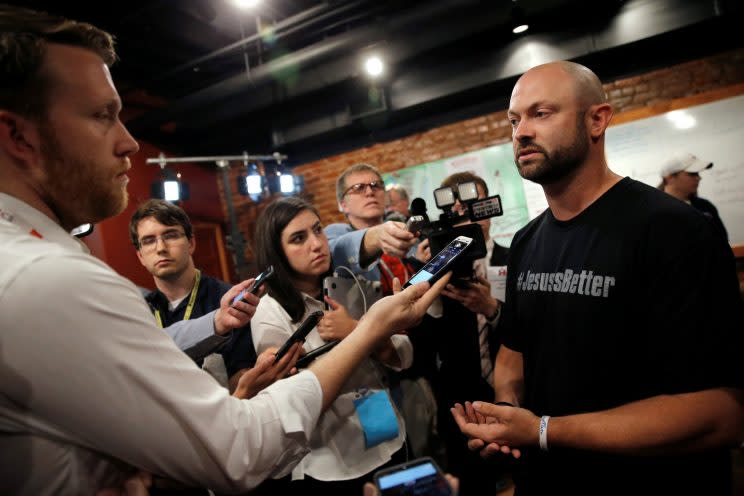Coal worker who challenged Clinton sets sights on Manchin
WASHINGTON — Exactly one year ago, out-of-work West Virginia coal industry worker Bo Copley delivered one of the 2016 presidential race’s most memorable moments when he challenged Hillary Clinton. Now Copley tells Yahoo News he has set his sights on unseating his state’s Democratic senator, Joe Manchin.
“With everything that has happened over the past year, with all of the attention we have received, with all of the people saying, ‘We really appreciate you representing us,’ we thought maybe people want someone to represent them who understands what they’re going through,” Copley said in a Tuesday telephone interview. “It’s what God’s telling me to do.”
Copley, 40, said he is filing some of the preliminary paperwork needed to get into the 2018 race. If he wins the Republican primary, he’d come up against Manchin, who used to govern West Virginia, where President Trump thumped Clinton by a 42-point margin. Given the state’s political tilt, Manchin is a key target for Senate Republicans looking to protect or expand their majority.
Asked for his assessment of Trump’s tumultuous young presidency, Copley replied: “So far, it’s kind of what I expected. There are some hits and there are some misses.” He praised Trump for executive actions rolling back environmental restrictions blamed for hurting the coal industry, but added that the president’s “lack of government experience” was hurting him elsewhere.
The Tuesday announcement came one year to the day after Copley, who lost his coal-company job in September 2015, became a defining figure in the 2016 campaign after confronting Clinton in Williamson, W. Va. Two months earlier, during a CNN town hall in March 2016, Clinton had said, “We’re going to put a lot of coal miners and coal companies out of business.”

Copley, a former maintenance planner and fill-in foreman, slid a photograph of his three children across the table toward her on that day in May.
“I want my family to know that they have a future here in this state,” he said. “I just want to know how you can say you’re going to put a lot of coal miners out of jobs and then come in here and tell us how you’re gonna be our friend,” he added, as Clinton listened intently.
The former first lady then described her language as “a misstatement.”
“What I said was totally out of context from what I meant. Because I have been talking about helping coal country for a very long time and I did put out a plan last summer,” she said. “What I was saying is that, the way things are going now, we will continue to lose jobs. That’s what I meant to say.”
The exchange, a rare unscripted back-and-forth between a candidate and a voter, made Copley something of a star for the GOP. In October, Republican West Virginia Sen. Shelley Moore Capito held a hearing on “the devastating effects that EPA’s anti-coal regulations are having on our state.” Copley was a witness, describing the events leading up to his layoff from the mining giant Arch Coal.
Copley’s candidacy may be a long shot. The Republican primary is expected to be crowded, with more established candidates who have résumés in state or even national politics. Manchin, who has been raising money and possesses a sizable campaign war chest, won by 24 points in 2012 while Barack Obama lost West Virginia by 27 points. Polling in late 2016 found the incumbent beating potential Republican challengers, though Copley was not included among them.
Manchin, who won his Senate seat in a 2010 special election, mostly hasn’t joined his fellow Democrats in rhetorical attacks on Trump. He was one of the few in his party to vote to confirm Supreme Court Justice Neil Gorsuch. He has cheered Trump’s actions such as his executive orders greenlighting the stalled portion of the Keystone XL Pipeline and withdrawing from the Trans-Pacific Partnership. Back in December, Manchin met with the president-elect at Trump Tower amid talk that the senator was under consideration for energy secretary, but he opted to remain in the Senate. In 2012, Manchin released one of the most memorable ads of that year’s election cycle, pinning Democratic climate-change legislation to a tree and shooting it as a sign of his willingness to buck his party.
Copley praised Manchin for working to secure retired coal miners’ health benefits as part of a compromise spending bill to keep government open to Oct. 1. He said he and the incumbent were “fighting for the same cause on that.”
But Manchin’s support of Clinton in 2016 “showed that he has lost touch with his constituents,” he said.
A spokesman for the Manchin campaign, Jefrey Pollock, told Yahoo News that the senator “looks forward to the coming campaign and having the voters review his clear record of strongly defending West Virginia’s interests.”
It’s an important race. Of the 33 Senate seats up for grabs next year, 25 are held by Democrats, 10 of those in states Trump won. There’s also a special election scheduled in deep-red Alabama to fill the vacancy left by Attorney General Jeff Sessions. Republicans have a narrow 52-48 edge in the Senate, and Democrats are predicting that their voters will be unusually active in next year’s midterm election.
Asked about his own politics, Copley said, “The thing that I’ve thought about the most is that we seem to be in the most divided system that we’ve ever seen,” and declared that “it’s time to put those things aside” and work on compromise.
“Not being a political person — not being in politics, or a politician — I would be the kind of person who would listen to the arguments from both sides, do what’s right,” he said.
Read more from Yahoo News:



